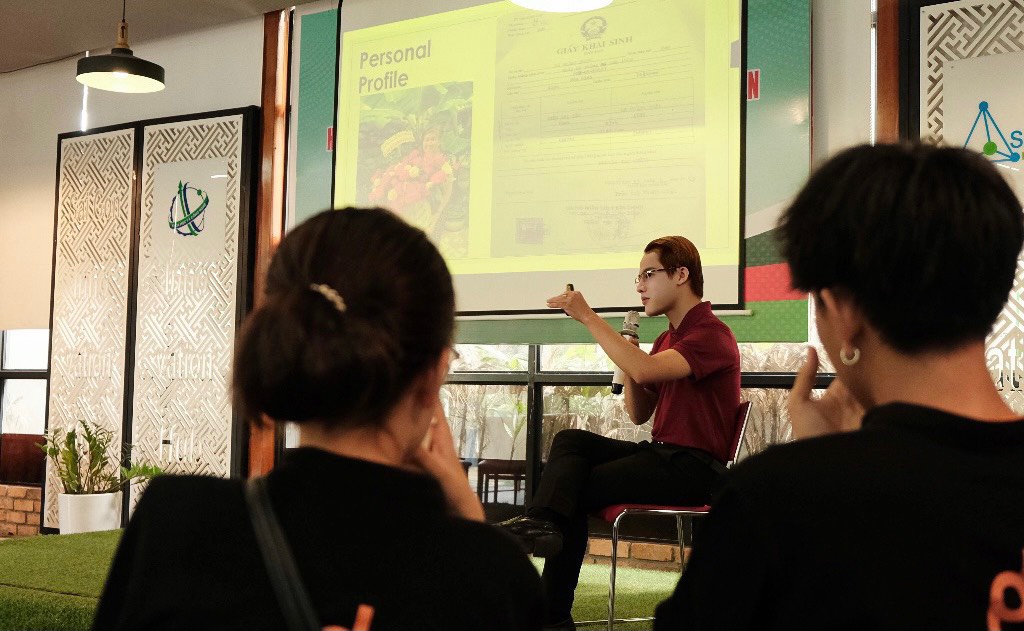Tiếng Anh Thuyết Trình Level 3
Nếu như bạn là học viên của lộ trình căn bản (Level 1;2;3;4) chương trình Tiếng Anh Thuyết Trình, thì chắc hẳn bây giờ bạn đã cảm thấy tự tin nhất định về mặt năng lực Anh ngữ trình độ B1, và kiến thức khoa học trải dài 24 chủ đề học tập lớn của mình, cũng như tự hào về việc mình đang sở hữu nhóm kỹ năng thuyết trình trong nhiều bối cảnh khác nhau.
Còn nếu như bạn là học viên của lộ trình nâng cao (Level 3;4;5;6) chương trình Tiếng Anh Thuyết Trình, thì YOURE tin chắc rằng bạn cũng đã biết rất rõ những kỹ năng Anh ngữ, kỹ năng thuyết trình của bản thân sẽ sớm được nâng cấp toàn diện sau khi học khóa Tiếng Anh Thuyết Trình level 3 này.
Vì level 3 của Tiếng Anh Thuyết Trình là điểm giao thoa giữa lộ trình căn bản cùng lộ trình nâng cao, nên 12 chủ đề học tập lớn của level 3 vì thế được sắp xếp một cách hài hòa nhất, để học viên lộ trình căn bản cảm thấy được sự thách thức trong độ khó của nội dung, cũng như để học viên lộ trình nâng cao cảm thấy được sự mới mẻ, thú vị trong khi bắt đầu hành trình học tập mới của mình.
Và dưới đây là 12 chủ đề học tập lớn của Tiếng Anh Thuyết Trình level 3:
– Tạo ra sự khác biệt;Những Xu Hướng Hiện Nay; Cải Thiện Chất Lượng Cuộc Sống;
– Thiết Kế Một Trang Web; Những Người Xây Dựng Cộng Đồng; Giao Tiếp Rõ Ràng;
– Nhận Diện Cá Nhân; Những Giải Pháp Giao Thông; Ngôn Từ Mới; Thấu Hiểu Cảm Xúc;
– Những Nhà Lãnh Đạo và Những Nhà Triết Học; Thịnh Vượng và Hạnh Phúc.
Cũng trong level 3 này, nhóm kỹ năng thuyết trình được đội ngũ chuyên gia học thuật YOURE lồng ghép, xây dựng theo tinh thần phát triển sâu các nhóm kỹ năng cơ bản ở level 1 và 2. Trong đó, YOURE tập trung vào việc bồi đắp các kỹ năng sau:
– Kỹ năng giúp khán giả trực quan hóa các khái niệm;
– Kỹ năng đưa ra các bình luận trực quan; – Kỹ năng vào đề với những số liệu thú vị;
– Kỹ năng đặt các câu hỏi tới khán giả trong khi thuyết trình;
– Kỹ năng kết thúc bài thuyết trình với nghệ thuật gieo hy vọng về một tương lai tươi sáng;
– Kỹ năng hòa mình cùng với khán giả;
– Kỹ năng sử dụng câu chuyện để cá nhân hóa các thông điệp;
– Kỹ năng đưa ra các đầu mối thông tin;
– Kỹ năng xóa bỏ khoảng cách;
– Kỹ năng trình diễn trên sân khấu;
– Kỹ năng đưa ra các câu trích dẫn phù hợp;
– Kỹ năng phát triển tính hài hước khi thuyết trình;
Và để đo lường sự tiến bộ trong học tập, mỗi học viên khi tham gia khóa học tiếng Anh thuyết trình level 3, đều được yêu cầu hoàn thành 4 video clip thể hiện kỹ năng thuyết trình bằng tiếng Anh của mình thông qua 4 chủ đề khác nhau.
Và xuyên suốt 12 chủ đề học tập lớn của Tiếng anh Thuyết Trình Level 3, học viên sẽ được học rất kỹ, rất sâu các skills tiếng Anh như Vocabulary; Grammar; Listening; Reading; Writing; Speaking; Communicating; Presenting qua 5 Bài học là các Lesson A, B, C, D, E. Và nội dung các bài học được sắp xếp một cách chặt chẽ, khoa học, để đảm bảo tính hiệu quả nhất cho sự phát triển của từng học viên.

Thông tin cơ bản
Tiếng Anh Thuyết Trình Level 3
Entry Level: trình độ A2+ theo khung CEFR
Target Level: trình độ B1 theo khung CEFR
Thời lượng học: 15 tuần (3 tháng 3 tuần)
Thời gian học: 3 buổi/ tuần; 90 phút/ buổi
Sỉ số lớp học: tối thiểu 6 học viên/ tối đa 10 học viên
Học phí: 7 triệu
Nội dung khóa học Level 3
Chủ đề 1
MAKING A DIFFERENCE
Chủ đề 2
TRENDS
Chủ đề 3
IMPROVING LIVES
THUYẾT TRÌNH
LẦN 1
Chủ đề 4
DESIGNING THE WEB
Chủ đề 5
COMMUNITY BUILDERS
Chủ đề 6
CLEAR COMMUNICATION
THUYẾT TRÌNH
LẦN 2
Chủ đề 7
IDENTITY
Chủ đề 8
TRANSPORTATION SOLUTIONS
Chủ đề 9
NEW WORDS
THUYẾT TRÌNH
LẦN 3
Chủ đề 11
UNDERSTANDING EMOTIONS
Chủ đề 11
LEADERS & THINKERS
Chủ đề 12
WELL-BEING
THUYẾT TRÌNH
LẦN 4

MAKING A DIFFERENCE
Lesson A:
– Vocabulary: Collocations to describe giving help
– Listening: Inspiring dreams
Lesson B:
– Language focus:
Function: Talking about present and past actions
Grammar: Review of present and past tenses
– Speaking: Talking about ways to help
Lesson C:
– Reading: Food rescue mission
Lesson D:
– TED Talk: A life lesson from a volunteer firefighter
– Presentation skills: Helping your audience visualize
Lesson E:
– Communicate: People who have made a difference
– Writing: Writing about someone who has made a difference in your life

TRENDS
Lesson A:
– Vocabulary: Collocations to describe trends
– Listening: Analysing trends
Lesson B:
– Language focus:
Function: Talking about future trends
Grammar: Review of future tenses: will and going to
– Speaking: Describing future trends
Lesson C:
– Reading: Identifying trends
Lesson D:
– TED Talk: How to start a movement
– Presentation skills: Commenting on visuals
Lesson E:
– Communicate: Consumer trends
– Writing: Making predictions about a product or service

Improving Lives
Lesson A:
– Vocabulary: Healthcare
– Listening: My health routine
Lesson B:
– Language focus:
Function: Talking about cause and effect
Grammar: Conjunctions for cause and effect
– Speaking: Talking about healthcare tech
Lesson C:
– Reading: The challenge of Alzheimer’s
Lesson D:
– TED Talk: My simple invention designed to keep my grandfather safe
– Presentation skills: Opening with interesting facts
Lesson E:
– Communicate: Innovative healthcare solutions
– Writing: Writing a letter about a tech solution for a healthcare issue

DESIGNING THE WEB
Lesson A:
– Vocabulary: Website features
– Listening: Designing websites
Lesson B:
– Language focus:
Function: Comparing products and services
Grammar: Comparatives and superlatives, (not) as … as, (very) different from …, … the same as …
– Speaking: Making decisions based on user reviews
Lesson C:
– Reading: Website design on a giant scale
Lesson D:
– TED Talk: How giant websites design for you (and a billion others, too)
– Presentation skills: Asking the audience questions
Lesson E:
– Communicate: Improving user experiences
– Writing: Writing a review of your cell phone

COMMUNITY BUILDERS
Lesson A:
– Vocabulary: Words for talking about communities
– Listening: Creating green spaces
Lesson B:
– Language focus:
Function: Talking about how places have changed
Grammar: The passive voice
– Speaking: Describing changes in my community
Lesson C:
– Reading: Barefoot College
Lesson D:
– TED Talk: How painting can transform communities
– Presentation skills: Ending with a hope for the future
Lesson E:
– Communicate: A neighbourhood survey
– Writing: Writing a letter about improving your neighbourhood

CLEAR COMMUNICATION
Lesson A:
– Vocabulary: Communication collocations
– Listening: Communication styles
Lesson B:
– Language focus:
Function: Talking about communication preferences
Grammar: Verb patterns with -ing and infinitive
– Speaking: Communication methods
Lesson C:
– Reading: Communication in the digital age
Lesson D:
– TED Talk: Talk nerdy to me
– Presentation skills: Engaging with your audience
Lesson E:
– Communicate: Explaining a topic of interest
– Writing: Writing what you learned about a topic

IDENTITY
Lesson A:
– Vocabulary: Words for talking about identity
– Listening: Multicultural experiences
Lesson B:
– Language focus:
Function: Talking about ongoing actions and events
Grammar: Present perfect progressive
– Speaking: Talking about living abroad
Lesson C:
– Reading: Global migration
Lesson D:
– TED Talk: Where is home?
– Presentation skills: Using stories to personalize your message
Lesson E:
– Communicate: A survey on identity
– Writing: Writing about factors that contribute to one’s identity

TRANSPORTATION SOLUTIONS
Lesson A:
– Vocabulary: Transportation collocations
– Listening: An unusual commute
Lesson B:
– Language focus:
Function: Making predictions
Grammar: will and might
– Speaking: Changes in global trave
Lesson C:
– Reading: Unique commutes
Lesson D:
– TED Talk: A skateboard, with a boost
– Presentation skills: Signposting
Lesson E:
– Communicate: Inventing a transportation device
– Writing: Creating a poster of a transportation device

New WORDS
Lesson A:
– Vocabulary: Words for talking about language
– Listening: Collecting words
Lesson B:
– Language focus:
Function: Talking about changes
Grammar: used to
– Speaking: Talking about changes in meaning
Lesson C:
– Reading: Language change
Lesson D:
– TED Talk: What makes a word “real”?
– Presentation skills: Closing the loop
Lesson E:
– Communicate: Guessing meanings
– Writing: Writing about the effect of the Internet on the English language

UNDERSTANDING EMOTIONS
Lesson A:
– Vocabulary: Feelings
– Listening: Dealing with emotions
Lesson B:
– Language focus:
Function: Reporting other people’s speech and thoughts
Grammar: Reported speech
– Speaking: Talking about EQ in jobs
Lesson C:
– Reading: Emotion in technology
Lesson D:
– TED Talk: This app knows how you feel
– Presentation skills: Giving a demonstration
Lesson E:
– Communicate: Applications of emotion-sensing technology
– Writing: Writing about whether there is a need for technology to recognize emotions

LEADERS & THINKERS
Lesson A:
– Vocabulary: Collocations for talking about doing business
– Listening: Starting a business
Lesson B:
– Language focus:
Function: Talking about obligation and giving advice
Grammar: Modals of necessity
– Speaking: Interview with a CEO
Lesson C:
– Reading: Lessons in business
Lesson D:
– TED Talk: Life at 30,000 feet
– Presentation skills: Quoting people
Lesson E:
– Communicate: My business philosophy
– Writing: Writing about how you would run a company

WELL-BEING
Lesson A:
– Vocabulary: Words for describing health and well-being
– Listening: What your brain does when you sleep
Lesson B:
– Language focus:
Function: Talking about imaginary situations
Grammar: Second condition
– Speaking: Describing your ideal lifestyle
Lesson C:
– Reading: Achieving work-life balance
Lesson D:
– TED Talk: How to succeed? Get more sleep
– Presentation skills: Using humor
Lesson E:
– Communicate: Debate on work-life balance
– Writing: Writing about how you could improve your productivity






